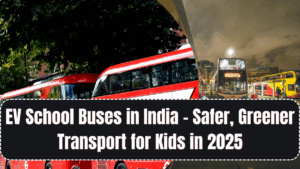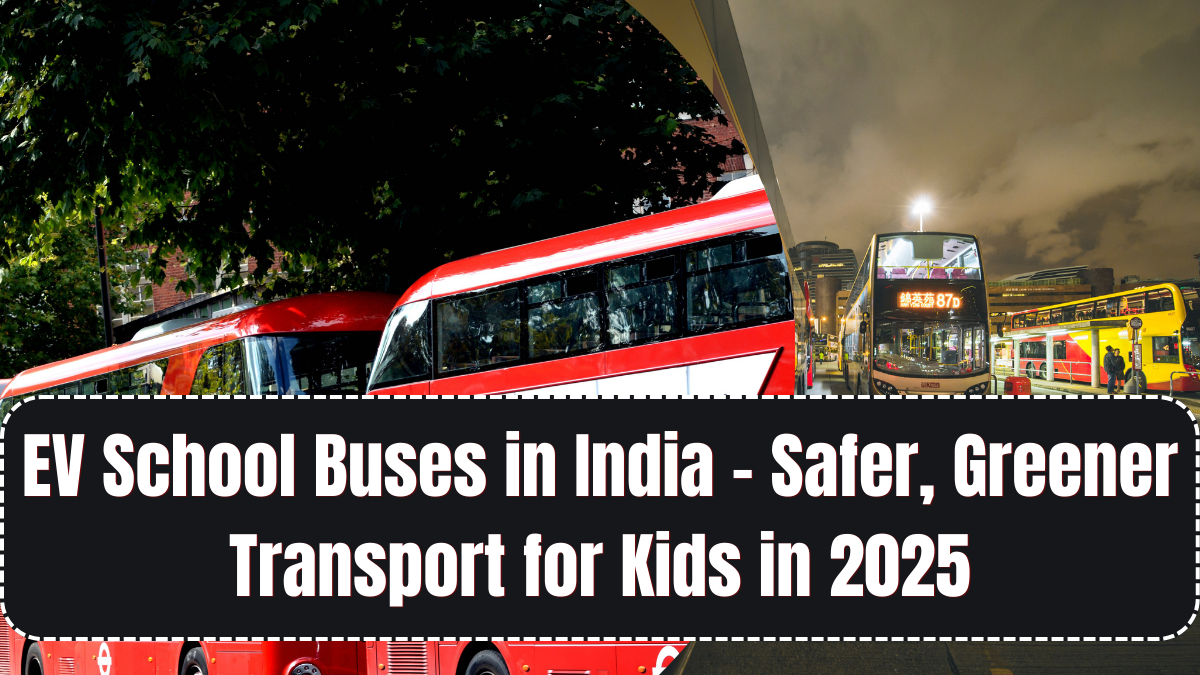The rollout of EV school bus India programs in 2025 marks a major transformation in how schoolchildren are transported across cities and towns. With increasing awareness around pollution and child safety, electric school buses are now becoming the preferred choice for school transport authorities, private operators, and parents alike. These buses are quiet, zero-emission, and equipped with smart safety features designed specifically for children.
Backed by state governments, electric mobility schemes, and local municipal bodies, the movement toward EV bus adoption is no longer experimental—it is a mainstream policy in several regions of India.

Districts Leading the EV School Bus Rollout
In 2025, many Indian states have taken the lead in deploying EV school bus India fleets, particularly in urban and semi-urban areas with high student density. Cities like Pune, Bengaluru, Hyderabad, Indore, and Kochi are seeing daily school runs handled by electric buses with full GPS and surveillance systems.
Notable districts with active EV school bus programs:
-
Pune Municipal Corporation – 70+ EV school buses introduced
-
Delhi NCR – pilot launched in over 50 private schools
-
Hyderabad – 40 e-buses added to government-aided school fleet
-
Indore – Smart City project integrates e-buses with public schools
-
Kochi – Green School Mobility Project initiated
This growth aligns with India’s larger electric mobility plan and ensures cleaner air and safer transportation for students.
Benefits of Electric Buses for School Transport
Switching to EV bus transport offers a wide range of benefits beyond just environmental gains. These buses are purpose-built for children’s safety, health, and daily comfort. The elimination of engine vibrations and noise creates a more peaceful journey for school children.
Key benefits of EV school buses:
-
Zero tailpipe emissions – protects children from exposure to harmful pollutants
-
Enhanced safety with CCTV, panic buttons, and speed limiters
-
Smooth, noise-free ride reduces travel fatigue
-
Lower operating costs – fuel and maintenance savings for schools
-
Reduced dependency on diesel and petrol fleets
By focusing on both school transport efficiency and eco-friendliness, EV adoption delivers long-term value.
Features and Technology in 2025 EV School Buses
Today’s EV school bus India models come fully equipped with the latest technology, ensuring that safety is not compromised. The government has set new standards for e-bus certification used in schools, mandating features that prioritize student welfare.
Advanced features include:
-
Real-time GPS tracking and parent mobile alerts
-
Child presence detection sensors (alerts if a child is left behind)
-
Fire suppression systems
-
Auto-lock doors while bus is moving
-
Smart air purification systems
-
AI-assisted driver behavior monitoring
These upgrades ensure that EV bus operations meet the needs of modern Indian schools while protecting children’s safety at every stage.
Government Support and Future Expansion Plans
In 2025, the central and state governments of India have launched funding schemes to help schools and private operators transition to EV school bus India fleets. Under the FAME II scheme and the School Mobility Electrification Initiative, subsidies and tax benefits are offered to promote wider adoption.
Ongoing government support includes:
-
Subsidies of up to ₹10–15 lakh per EV bus
-
GST reduction from 18% to 5% for school-use electric buses
-
Financing partnerships through state banks and energy firms
-
Free charging infrastructure setup for select schools under PPP models
The goal is to make electric school transport affordable and widely accessible in both urban and rural settings.
FAQs
What is the EV school bus India initiative?
EV school bus India refers to the nationwide push in 2025 to adopt electric buses for school transport, aimed at reducing pollution and increasing child safety.
Which cities in India are using EV school buses?
Cities like Pune, Hyderabad, Delhi, and Kochi have already deployed electric buses for daily school transport under local government initiatives.
Are EV school buses safe for children?
Yes, EV bus models used in schools are fitted with advanced safety tools such as GPS, CCTV, speed governors, and child detection sensors to ensure maximum safety.
Do schools receive financial help to switch to electric buses?
Yes, under government schemes like FAME II, schools and private operators get subsidies and tax benefits to adopt EV school bus India models.
What are the running costs of EV school buses compared to diesel?
EV bus models have lower running costs due to cheap electricity rates and minimal maintenance, making them more economical than diesel buses in the long term.
Click here to know more.
